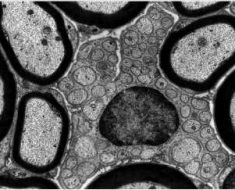
While we typically measure our age in years, the true mark of biological aging is cellular aging.
In other words, the DNA of our cells can tell us how much our bodies have aged.
As we explain, the ends of our chromosomes are the best indicators of cellular aging.
Called telomeres, these structures are made of DNA strands and proteins. Every time a cell divides, telomeres shorten until the cell is senescent and dies.
Therefore, the length of the telomeres is the best indicator of how old a cell is.
While the shortening of telomeres is a natural process, accumulated damage in cells can speed up this process and lead to the premature death of cells. Damaged cells and shorter telomere length have been associated with chronic diseases and cancer.
Some of the factors that damage the cells are environmental and “modifiable,” meaning you can do something about them. These include diet, exposure to ultraviolet rays, alcohol consumption, and lifestyle (more stress can speed up cellular aging, while exercise keeps your cells younger).
New research, now published in the American Journal of Epidemiology, zeroes in on one of these modifiable risk factors for cellular aging: diet.
More specifically, a team of researchers led by Cindy Leung, an assistant professor of nutritional sciences at the University of Michigan School of Public Health in Ann Arbor, has found a link between maintaining a healthful diet and the length of telomeres.

What a healthful diet consists of
Leung and colleagues explored the dietary habits of almost 5,000 adult men and women aged 20–65. The data were obtained from the National Health and Nutrition Examination Survey.
Using these data, the team assessed the participants’ adherence to the Mediterranean diet and the Dietary Approaches to Stopping Hypertension (DASH) diet, as well as their scores on the Healthy Eating Index and the Alternate Healthy Eating Index.

The latter two were developed by the United States Department of Agriculture in collaboration with the Harvard T.H. Chan School of Public Health in Boston, MA.
“All four diets,” states Leung, “emphasize eating plenty of fruits, vegetables, whole grains, and plant-based protein and limiting consumption of sugar, sodium, and red and processed meat.”
Overall, the research found a significant association between high adherence to any of these diets and longer telomere length.
“[T]he findings suggest,” explains Leung, “that following these [four dietary] guidelines is associated with longer telomere length and reduces the risk of major chronic disease,” adding, “We were surprised that the findings were consistent regardless of the diet quality index we used.”
Study co-author Elissa Epel, a professor of psychiatry at the University of California, San Francisco, weighs in on the possible mechanisms that could explain the association.
“[T]he commonality to all of the [healthful] diet patterns is that they are antioxidant and anti-inflammatory diets. They create a biochemical environment favorable to telomeres.”

Sex differences in dietary benefits
Intriguingly, the same associations were — although noticeable — not statistically significant among men. The scientists offer possible explanations for why this may be. “We have seen some [sex] differences in previous nutrition and telomere studies,” Leung says.
“In our study,” she continues, “as well as in previous studies, men tended to have lower diet quality scores than women. Men also had higher intakes of sugary beverages and processed meats, both of which have been associated with shorter telomeres in prior studies.”
“It’s possible that not all foods affect telomere length equally and you need higher amounts of protective foods in order to negate the harmful effects of others. However, more research is needed to explore this further,” concludes Leung.
“The key takeaway is that following a [healthful] diet can help us maintain healthy cells and avoid certain chronic diseases […] Emphasis should be placed on improving the overall quality of your diet rather than emphasizing individual foods or nutrients.”
Cindy Leung
Source: Read Full Article





